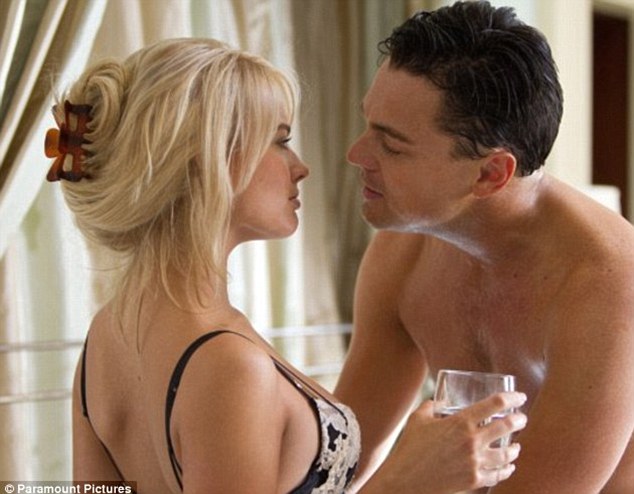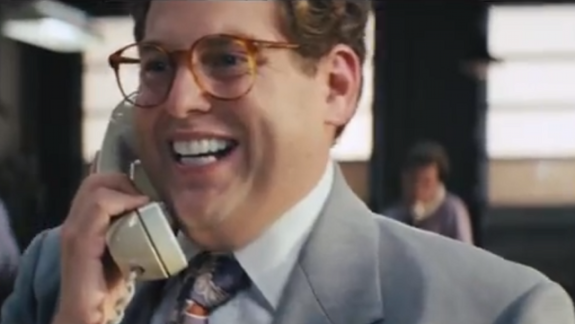Martin Scorsese’s The Wolf of Wall Street is a romp into a Roman circus of excess.

The three-hour film, a biting and hugely entertaining satire on the perils of unregulated capitalism and the pitfalls of greedy materialism, is rife with sex, drugs, immorality, conspicuous consumption and profane language.
Is it a trenchant commentary on the ills of contemporary American society? Maybe.
It revolves around Jordan Belfort (Leonardo DiCaprio), a crude, lewd, unscrupulous, fast-living, money-crazed, sex-addicted, cocaine-sniffing Wall Street broker who cheated investors out of $200 million and learned that crime does not pay.
Belfort, the son of two Jewish accountants from the Bronx, wrote his memoirs while in prison in the late 1990s, and Terence Winter’s witty screenplay is largely based on it.
An incredibly crass materialist whose sole ambition was to be rich, Belfort launched his career on Wall Street in 1997, on the eve of the big stock market crash in October of that year. He began as a “cold caller,” phoning prospective clients for business. Having landed his quarry, he handed over the file to a stock broker, who profited mightily from the transaction.
Belfort’s mentor, Mark Hanna (Matthew McConaughey), was a real hustler, and in an uproarious scene that unfolds in a fancy restaurant, he gives him an unorthodox lesson on the elements of success. The name of the game, he tells Belfort, is to move money from a client’s pocket into a broker’s pocket. It’s that simple. “We don’t build anything,” Hanna says in a gleeful admission.
The key to a successful career on Wall Street, he adds in an unexpected twist, is to relieve one’s tension by means of a regular regimen of drugs, hookers and masturbation. Belfort, amused and impressed, becomes a dedicated convert, particularly after the blue-chip company he works for goes belly up.
This early scene, so vivid and captivating thanks in large part to McConaughey’s astonishing performance, sets the tone for the entire movie, a madcap adventure of unrestrained behavior in the pursuit of the earthly riches, consumer and carnal, that America offers.
Having lost his job, Belfort answers an ad for a position on Long Island. It`s a sleazy boiler room operation where penny stocks from fly-by-night companies are sold to unsuspecting customers. Motivated by the potential profit margins, Belfort takes to it like a fish to water, cynically pawning off “garbage to garbagemen.”
With profits pouring in like a torrent, Belfort forms his own company, Stratton Oakmont, recruiting personnel from the bedraggled penny stock outfit. One of his first hires is Donnie Azoff (Jonah Hill), a tubby, curly-haired, bug-eyed, cuddly parvenu who’s on the same wave length as Belfort. They celebrate their triumphs with office parties that are the last word in debauchery.
With the dollars rolling in at an ever faster clip, the partners can afford every conceivable whim and indulgence, even a $26,000 dinner, complete with a roster of prostitutes. Belfort’s father, Max (Rob Reiner), professes to be outraged by their extravagance and dissoluteness, but his reprimand has no effect whatsoever.

Belfort is on a roll, so much so that he dumps his wife for Naomi (Margot Robbie), a gorgeous blonde-cum-trophy wife. Nothing is too good for her, including a 150-foot luxurious yacht equipped with a helicopter, and a mansion on Long Island’s Gold Coast.
Beloved by his employees, Belfort provides them with the only possible advice his brain can concoct: “Deal with your problems by becoming rich.” They take heed of his wisdom by tricking their clients and lining their wallets. All the while, the best performers in the office are treated to wild sex parties where, optically speaking, Scorsese leaves little to the imagination.
Of course, the FBI is on to Belfort and his slimy associates, who specialize in stock manipulation and fraud. Denham (Kyle Chandler), the steely and upright agent in charge of the investigation, visits Belfort aboard his yacht. As Denham leaves, Belfort throws a wad of dollar bills at him in an arch gesture of contempt.
Rattled by Denham’s visit, Belfort flies off to Geneva to consult a corrupt Swiss banker named Saurel (Jean Dujardin), who tacitly suggests that a bit of money laundering can solve his problems.
For all his brushes with the law, however, Belfort is an equal-opportunity employer. In a rousing speech before his employees, he likens Stratton Oakmont to modern America, a land where the descendants of the Mayflower, as well as the sons and daughters of Haitian boat people, can thrive, if only given a chance.
It’s one of the subliminal themes of The Wolf of Wall Street, the 21st century version of Oliver Stone’s Wall Street. But more than anything else, Scorsese’s film is about the rampant greed that drives and defines Wall Street.

Scorsese’s taste in actors is flawless. Di Caprio is excellent, seamlessly inhabiting Belfort’s body and soul. Hill milks his character for all he is worth, and Robbie is sensuous and explosive. Jon Favreau, playing Belfort’s crooked lawyer, is also a standout.
The movie, though fun to watch, is self-indulgently too long by about an hour. Scorsese is a master entertainer, but he repeats himself all too often here. Ruthless editing might have made the difference between a good and a great film.